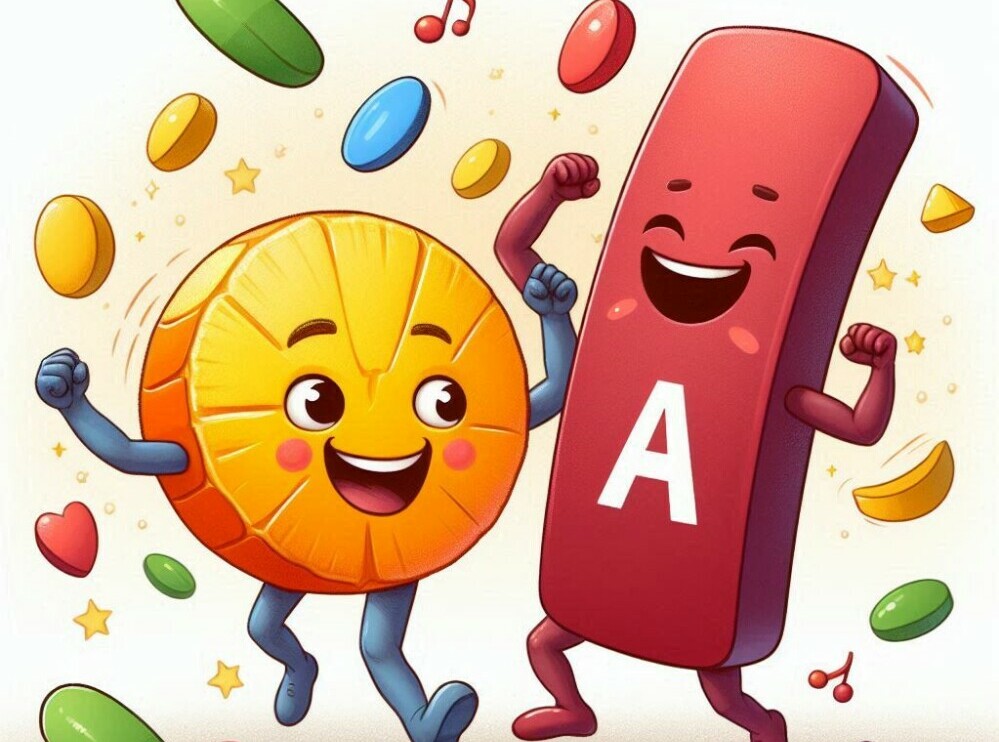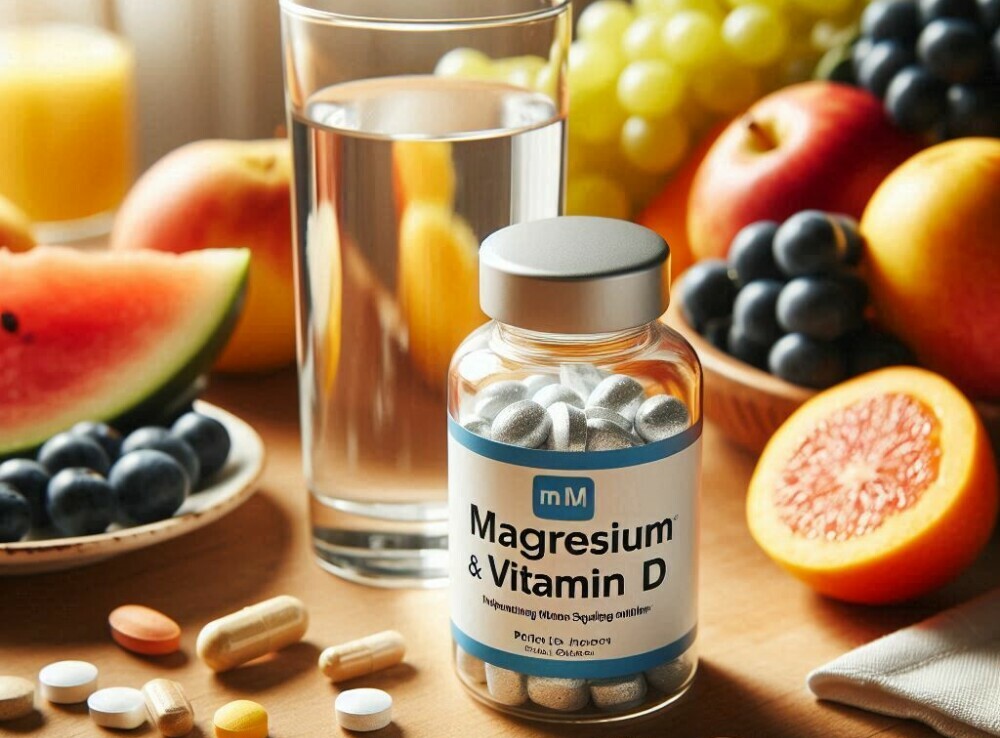Understanding which vitamins and minerals work well together can make a big difference in how your body uses these nutrients. Some combinations can help your body absorb and use the vitamins and minerals better, while others might do the opposite. Knowing the right pairs can help you make the most out of your diet and supplements.
Key Takeaways
- Pairing Vitamin A and Iron can boost the body’s ability to make haemoglobin, which is essential for carrying oxygen in the blood.
- B Vitamins work best when taken together, supporting energy, metabolism, and brain function.
- Calcium and Magnesium are crucial for bone health and muscle function, and they work better when taken together.
- Vitamin C can enhance the absorption of Iron, making it easier for the body to use this important mineral.
- Multivitamins offer a convenient way to get a balanced mix of essential vitamins and minerals in one go.
Vitamin A and Iron
Benefits of Combining Vitamin A and Iron
Combining vitamin A and iron can be very beneficial for your health. Vitamin A helps your body use iron more effectively. This is important because iron is needed to make haemoglobin, a protein in red blood cells that carries oxygen. When you have enough vitamin A, your body can better use the iron you get from food or supplements.
How to Incorporate Vitamin A and Iron in Your Diet
Here are some easy ways to get both vitamin A and iron in your meals: 1. For breakfast, try a bowl of iron-fortified cereal with a glass of carrot juice.
1. For breakfast, try a bowl of iron-fortified cereal with a glass of carrot juice.
 2. At lunch, make a salad with spinach, which is high in iron, and add some sweet potato, which is rich in vitamin A.
2. At lunch, make a salad with spinach, which is high in iron, and add some sweet potato, which is rich in vitamin A.
 3. For dinner, cook liver with a side of steamed carrots.
3. For dinner, cook liver with a side of steamed carrots.
Potential Risks of Overconsumption
While getting enough vitamin A and iron is important, too much can be harmful. Too much vitamin A can cause dizziness, nausea, and even liver damage. Similarly, too much iron can lead to stomach pain, constipation, and in severe cases, organ damage. Always consult your doctor before taking supplements to avoid these risks.
It’s crucial to balance your intake of vitamins and minerals to stay healthy. Overdoing it can lead to serious health problems.
B Vitamins: The Synergistic Group
Roles of Different B Vitamins
 B vitamins, including B1 (thiamine), B2 (riboflavin), B3 (niacin), B5 (pantothenic acid), B6 (pyridoxine), B7 (biotin), B9 (folate), and B12 (cobalamin), play essential roles in the body. They support metabolism, energy production, and brain function, and maintain healthy skin, hair, and nails. Each B vitamin has a unique function, but they often work best when taken together.
B vitamins, including B1 (thiamine), B2 (riboflavin), B3 (niacin), B5 (pantothenic acid), B6 (pyridoxine), B7 (biotin), B9 (folate), and B12 (cobalamin), play essential roles in the body. They support metabolism, energy production, and brain function, and maintain healthy skin, hair, and nails. Each B vitamin has a unique function, but they often work best when taken together.
Benefits of Taking B Vitamins Together
When B vitamins are combined, they can have a synergistic effect, meaning they work better together than alone. For example, B6, B12, and folate (B9) help reduce high levels of homocysteine, which is linked to a higher risk of heart disease. This combination can also support overall cardiovascular health.
The combined use of B vitamins and probiotics promotes better health outcomes, as they can work together to alleviate certain conditions.
Best Sources of B Vitamins
You can find B vitamins in a variety of foods:
- B1 (Thiamine): Whole grains, pork, and fish
- B2 (Riboflavin): Eggs, lean meats, and green vegetables
- B3 (Niacin): Poultry, fish, and whole grains
- B5 (Pantothenic Acid): Avocados, yoghurt, and eggs
- B6 (Pyridoxine): Chickpeas, bananas, and potatoes
- B7 (Biotin): Nuts, seeds, and sweet potatoes
- B9 (Folate): Leafy greens, legumes, and citrus fruits
- B12 (Cobalamin): Meat, dairy products, and fortified cereals
Including a variety of these foods in your diet can help ensure you get a balanced intake of B vitamins.
Calcium and Magnesium
Importance of Calcium and Magnesium for Bone Health
Calcium and magnesium are essential for keeping bones strong and healthy. Magnesium helps bones develop and stay dense, while calcium is the main mineral that makes up the structure of bones and teeth. Together, they work to maintain bone health throughout life.
How Calcium and Magnesium Work Together
Magnesium and calcium work closely to support bone health. Magnesium helps prevent calcium from entering soft tissues, where it can be harmful. It also supports calcium in regulating the heartbeat and encourages vitamins like D and K to help with calcium absorption. While your body can store calcium, magnesium levels need to be replenished daily.
Dietary Sources and Supplements
To get enough calcium and magnesium, you can eat foods like dairy products, leafy greens, nuts, and seeds. If you need more, supplements are available. For adults, the recommended daily intake is at least 1,000mg of calcium and a proper amount of magnesium. Women over 51 and men over 70 should increase their calcium intake to 1,200mg per day.
Magnesium supplements can help bones remain strong by working in combination with calcium. Discover how they work together for bone health in our guide.
Vitamin C and Iron
Enhancing Iron Absorption with Vitamin C
Vitamin C helps iron absorption in the body. Iron is crucial for carrying oxygen in the blood and keeping the immune system strong. Vitamin C, known for its antioxidant properties, boosts the absorption of iron, especially from plant-based sources like leafy greens and nuts. This is important because plant-based iron is not as easily absorbed as iron from meat.
Dietary Tips for Combining Vitamin C and Iron
To get the most out of this nutrient pair, try these meal ideas:
 For breakfast, have a bowl of iron-fortified cereal with sliced strawberries or kiwi.
For breakfast, have a bowl of iron-fortified cereal with sliced strawberries or kiwi.
 For lunch, make a spinach salad with black beans, red pepper strips, and tomato slices.
For lunch, make a spinach salad with black beans, red pepper strips, and tomato slices.
 For dinner, stir-fry shrimp, broccoli florets, mushrooms, and sesame seeds.
For dinner, stir-fry shrimp, broccoli florets, mushrooms, and sesame seeds.
Who Benefits the Most from This Combination?
People at risk of iron deficiency, such as young children, pregnant and menstruating women, vegetarians, and the elderly, can benefit greatly from combining vitamin C and iron. Another option is to pair iron-rich foods or supplements with a vitamin C supplement.
Vitamin D Combinations
 Vitamin D is a crucial nutrient that works well with several other vitamins and minerals. Here are some key combinations to consider:
Vitamin D is a crucial nutrient that works well with several other vitamins and minerals. Here are some key combinations to consider:
Calcium and Vitamin D for Bone Health
 One of the most well-known pairings is vitamin D and calcium. Vitamin D is essential for the absorption of calcium in the intestines, which helps maintain appropriate calcium levels in the blood. By taking these two together, you can help ensure that your body effectively utilizes the calcium you consume to support bone health.
One of the most well-known pairings is vitamin D and calcium. Vitamin D is essential for the absorption of calcium in the intestines, which helps maintain appropriate calcium levels in the blood. By taking these two together, you can help ensure that your body effectively utilizes the calcium you consume to support bone health.
Vitamin K and Vitamin D for Cardiovascular Health
 Vitamin K and D work together to support bone health and proper blood clotting. While vitamin D facilitates calcium absorption, vitamin K is vital for directing calcium into the bones and away from the arteries and soft tissues. Together, they help maintain bone density and cardiovascular health.
Vitamin K and D work together to support bone health and proper blood clotting. While vitamin D facilitates calcium absorption, vitamin K is vital for directing calcium into the bones and away from the arteries and soft tissues. Together, they help maintain bone density and cardiovascular health.
Magnesium and Vitamin D for Enhanced Absorption
 Magnesium activates vitamin D, helping to ensure its effectiveness. Studies suggest that magnesium supplementation may improve the utilization of vitamin D for maintaining bone health. Taking these nutrients at the same time can help ensure your body has what it needs to support normal vitamin D levels.
Magnesium activates vitamin D, helping to ensure its effectiveness. Studies suggest that magnesium supplementation may improve the utilization of vitamin D for maintaining bone health. Taking these nutrients at the same time can help ensure your body has what it needs to support normal vitamin D levels.
Multivitamins: A Comprehensive Solution
Taking individual vitamin supplements to meet all your nutritional needs can take time and effort. This is where multivitamins shine. A well-formulated multivitamin combines vitamins and minerals that work synergistically and provide a broad spectrum of nutrients, helping ensure you get all the essential pairings.
Advantages of Taking Multivitamins
Multivitamins offer a convenient way to cover your nutritional bases. They simplify the process of getting the right vitamins and minerals, especially for those with busy lifestyles. Instead of juggling multiple supplements, one multivitamin can provide a balanced mix of nutrients.
Key Nutrient Combinations in Multivitamins
Multivitamins often include combinations of vitamins and minerals that work well together. For example:
- Vitamin D and Calcium: Support bone health.
- Vitamin C and Iron: Enhance iron absorption.
- B Vitamins: Aid in energy production and metabolism.
Choosing the Right Multivitamin for You
When selecting a multivitamin, consider your specific needs. Look for one that matches your age, gender, and health goals. It’s also important to check the label for the amounts of each nutrient to ensure it meets your dietary requirements.
Multivitamins can simplify your supplement routine, making it easier to get the nutrients you need without the hassle of multiple pills.
Remember, while multivitamins are helpful, they should complement a balanced diet, not replace it. Always consult with a healthcare professional before starting any new supplement regimen.
Conclusion
Understanding which vitamins and minerals work well together can help you get the most out of your diet and supplements. Pairing nutrients like vitamin C with iron or vitamin D with calcium can boost their absorption and effectiveness. On the other hand, some combinations might not be as beneficial and could even hinder absorption. By learning about these nutrient pairings, you can make smarter choices for your health. Remember, a balanced diet and a well-chosen multivitamin can simplify this process, ensuring you get the right nutrients working together for your overall well-being.
Frequently Asked Questions
Why should I take Vitamin A and Iron together?
Vitamin A helps your body use iron more effectively. Together, they support the creation of haemoglobin, which carries oxygen in your blood.
Can I take all B Vitamins at the same time?
Yes, B Vitamins work best when taken together. They support energy, brain function, and healthy skin, hair, and nails.
How do Calcium and Magnesium benefit bone health?
Calcium and Magnesium work together to maintain strong bones. Calcium builds bones, while Magnesium helps your body use Calcium properly.
Why is Vitamin C good for iron absorption?
Vitamin C helps your body absorb iron from plant-based foods. This is especially important for people who don’t eat meat.
What are the benefits of combining Calcium and Vitamin D?
Vitamin D helps your body absorb Calcium, which is important for strong bones. Taking them together ensures you get the most benefit.
Are there vitamins and minerals I shouldn’t take together?
Yes, some combinations can block absorption. For example, avoid taking Calcium and Iron together. Always check with a healthcare professional.
I hope this post helps you better understand how to combine vitamins and minerals for optimal health. After much research, I’ve found some of the best combinations. If you have any questions, or would like to share your suggestions and experiences, feel free to reach out!
Elena
References:
- Why You Need Calcium & Magnesium for Good Health
- Vitamin D – Fact Sheet for Health Professionals
- Multivitamin/mineral Supplements
This article is for informational purposes only and is not a substitute for professional medical advice. Always consult your doctor before making health-related decisions.

